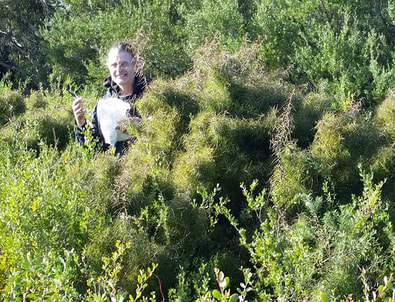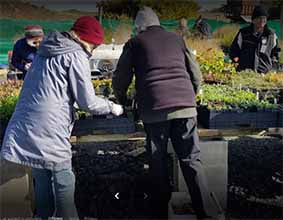 Chris Catterall collects seed from a Furze Hakea.
Chris Catterall collects seed from a Furze Hakea. By Terri Allen
IT WAS a cool Monday morning when 10 of us braved the elements to collect seeds on the Wonthaggi Heathland. Thankfully, the sandy track had been firmed by the weekend’s rain. Soon observations were ringing out: “Heaps of Sweet Wattle in flower over here!” “Look, yellow worms!” “This Prickly Geebung is flowering out of season!” “Ooh, orchid leaves!”
We reached our destination, a patch of Furze Hakea pushing through encroaching Coast Teatree, collecting a miniscule amount of seed. Our only other patch of this hakea has recently died out, so we wanted to propagate this plant at our nursery at the State Coal Mine and then put in some patches at local sites.
IT WAS a cool Monday morning when 10 of us braved the elements to collect seeds on the Wonthaggi Heathland. Thankfully, the sandy track had been firmed by the weekend’s rain. Soon observations were ringing out: “Heaps of Sweet Wattle in flower over here!” “Look, yellow worms!” “This Prickly Geebung is flowering out of season!” “Ooh, orchid leaves!”
We reached our destination, a patch of Furze Hakea pushing through encroaching Coast Teatree, collecting a miniscule amount of seed. Our only other patch of this hakea has recently died out, so we wanted to propagate this plant at our nursery at the State Coal Mine and then put in some patches at local sites.
| The sky darkened in the west and a squall swept across the dunes; it enveloped us but we persevered around the block, viewing the recent ecological burn and noting future seed sources. There were sheoaks galore, plenty of gums and teatrees, lots of Silver Banksias, but little else. We have been observing this for the past few years, less and less seed to collect. Plants have flowered, some at strange times, but seed hasn’t set. Why? Perhaps the pollinators weren’t available. Perhaps it’s been too hot/dry/wet/cold. Butterflies have flourished over summer, but ants, flies, spiders and beetles seem to have been in short supply. | Open day: Wonthaggi Seed Bank and Nursery at the State Coal Mine on Wednesday, May 12, or Saturday, May 15, from 10am-2pm. Tubestock plants are $1.65 |
If our flora fails, there will be a devastating flow-on to our wildlife: birds, possums, bush rats, antechinus, dunnarts, bandicoots, bats, wombats, echidnas, koalas, frogs, eels, long-necked turtles …
Have you noticed fewer animal scats and scratchings, less birdlife (apart from recently introduced Rainbow Lorikeets and Nosy Miners), little insect activity? It’s something to add to your walks in the bush – listen, look, observe. Are things changing?
We’re helping the environment by propagating out indigenous species and replanting acres of our bush. As well we plant in our gardens for extra seed sources. I still have a magnificent Old Mate Messmate in my yard, here when my grandfather settled the block ca. 1913.
If you’re interested in helping out and wish to refurbish your garden with indigenous plants, come up to the Wonthaggi Seed Bank and Nursery at the State Coal Mine on Wednesday, May 12, or Saturday, May 15, from 10am-2pm. Tubestock plants are $1.65.
See you there.
Have you noticed fewer animal scats and scratchings, less birdlife (apart from recently introduced Rainbow Lorikeets and Nosy Miners), little insect activity? It’s something to add to your walks in the bush – listen, look, observe. Are things changing?
We’re helping the environment by propagating out indigenous species and replanting acres of our bush. As well we plant in our gardens for extra seed sources. I still have a magnificent Old Mate Messmate in my yard, here when my grandfather settled the block ca. 1913.
If you’re interested in helping out and wish to refurbish your garden with indigenous plants, come up to the Wonthaggi Seed Bank and Nursery at the State Coal Mine on Wednesday, May 12, or Saturday, May 15, from 10am-2pm. Tubestock plants are $1.65.
See you there.
